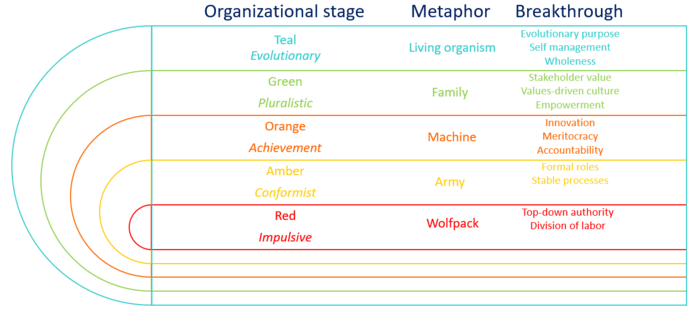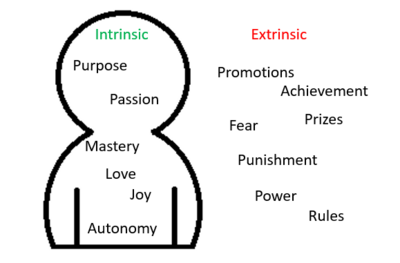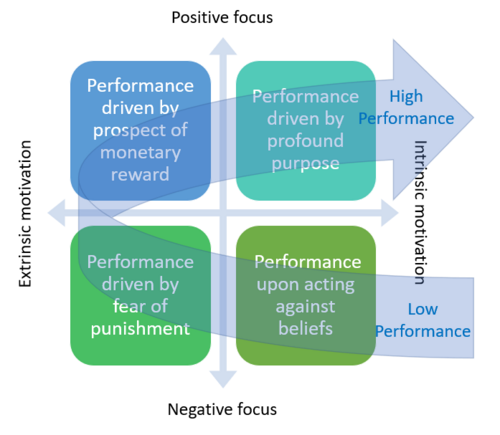Evolutionary purpose as motivational driver in project and programme management
Contents |
Abstract
In project or programme management, defining purpose is one of the key activities for success. On purpose, The project guide How to DO Projects: A Nordic Flavour to Managing Projects states: "Purpose gives a project direction, sets the boudaries of the project, and defines its success... Managing a project from the purpose perspective is about the adventurous and entrepreneurial spirit to dare to dream and turn dreams into reality...". This conception of purpose, is further developed by Frederic Laloux in the book Reinventing organizations. Here, in an organizational context, Laloux describes the power of a profound purpose, which is is valued over profit or competitive advantage. This profound purpose is described as an evolutionary purpose.
This article investigates how an evolutionary purpose can be used as a motivational driver in project and programme management - suggesting that a powerful purpose might be an even more important factor in achieving success with a project or programme, than on-point budgetting and scheduling. The article dives into exstrinsic versus instrinsic types of motivation and how these affect the behaviour of individuals and performance of teams. The article also gives pratical examples of how to listen to evolutionary purpose in project and programme management.
Background
Teal
A new managerial trend is occuring across industries, countries and cultures. A managerial paradigme which is changing the way we view and do organizations. The paradigme has first been described by belgian management consultant and author Frederic Laloux, as the perception of organizations as living entities where every employee extradites his/her full potential. This is a clear contrast to a more traditional view on organizations, as machines that needs to be steered and controlled and where employees are often constrained by organizational dogma and cultural hierachy. This new manegerial paradigme has been named teal as the colour, and the name is used to distinguish the paradigme from previous paradigmes of how we have been organising ourselves in groups through history as human beings. The historic evolution of orgnisations is illustrated in Figure 1. Forming the foundation of teal are three pillars; Self management, wholeness and evolutionary purpose. The concept of evolutionary purpose is the perception, that an organization has a profound sense of purpose and that great things can happen if an organization finds a way to listen to and make decisions based on this evolutionary purpose.
Teal in project management
Laloux doesn't spend much time discussing teal from a project or programme management point of view. This is a consequence of the anti-managerial nature of teal, in which decisions are being made on the floor and no one has the authority over anyone else. Planning and budgetting are not recommended, as he believes these concepts limit agility and flexibility of projects and project deliverables. This, of course is very far from conventional project management practices, as we know from the many standards there are on the topic.
Following the guidelines of Laloux require a highly developed sense of consciousness within an organization and certainly within the governance boards and management teams of projects and programmes - and should the pratices of Laloux be followed within this high level of consciousness, the project is at a high risk to be shut down (by the governance board, due to mismanagement) or in other ways become a failure as a result of contradicting practices. Ironically, the concept of purpose in project management and the ability to create a purpose in a project is broadly considered a key parameter in succeeding with the project, this is emphasized in the project guide How to DO Projects: A Nordic Flavour to Managing Projects, where purpose is described as one of the four main themes of project management, covering the scope of the project and answering the great underlaying questions: Why is this project important? Therefore, it seems apparent that it should be possible to listen to an evolutionary purpose in project and programme mangement, while still manage a project using conventional project management approaches.
Extrinsic versus intrinsic motivation
So what does it mean to listen to evolutionary purpose and what exactly can it bring to a project or programmme team?
Listening to an evolutionary purpose is to do something that makes a difference - because it makes a difference, work in an environment which fullfills - because if fullfills, to act in accordance to ones world view - because those are your world views. Basicallly, the things that trigger intrinsic rewards, by motivation through activities or a sense of purpose. Opposed to this, there are certain things in project or programme management practices which prevents us from listening to an evolutionary purpose. Examples of this are focusing on the achievement in itself, being driven by the prospect of a reward, acting due to fear of a consequences etc.
Motivation and performance
yadda yadda yadda...
OK, so this is not all done yet - but its friday and Im tired! Bear with me...
Listening to evolutionary purpose
Limitations
Annotated bibliography
BOOKS, Lots of books baby!
References
- Project Team Roles and Responsibilities, Spring 2018 [1]
- Belbin Team Roles, Spring 2018 [2]
- How to successfully go through the Five Stages of Team Development, Fall 2016 [3]
- Group Dynamics and Personality Types, Fall 2014 [4]
- Designing Project Teams, Fall 2014 [5]


